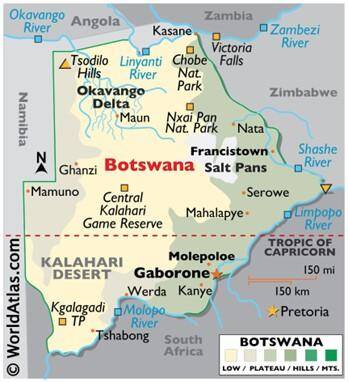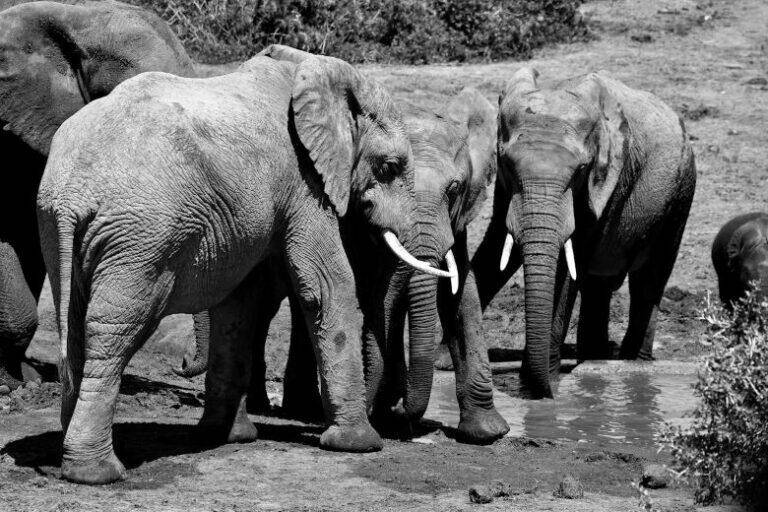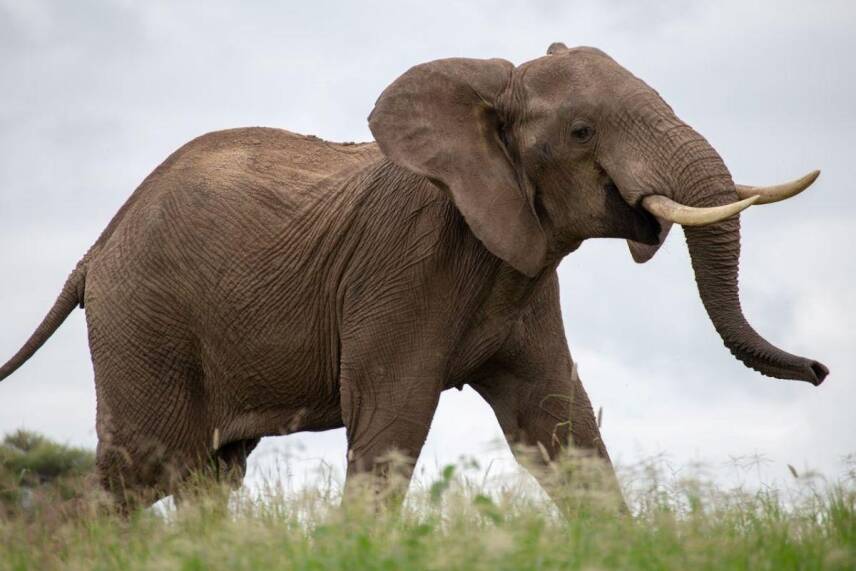With the lifting of the hunting ban in Botswana, how has this affected hunting in the region? And does hunting play a role in conservation? Are there any initiatives in place to assist with the conservation of this elephant community – and are these initiatives needed, since Botswana is home to the largest elephant population on the continent? Let’s dive into these questions and more, relating to conservation and elephant hunting in Botswana.
[DYNAMIC-BLOGTABLEOFCONTENT]
Botswana as a Hunting Destination
Botswana is a landlocked country in sub-Saharan Africa, sharing its borders with Namibia, Zambia, Zimbabwe, and Namibia.Visitors come to experience the Okavango Delta, Chobe National Park, and vast savannahs filled with game and birdlife As a wildlife destination, it is home to an array of game, from dangerous and big game to specialty and African plains game species, making hunting in Botswana a thrilling and sought-after experience.
Six of the Dangerous 7, including the African elephant, leopard, lion, Cape buffalo, Nile crocodile, and hippo can be hunted in Botswana. In fact, elephant hunting in Botswana is considered one of the best elephant hunting safaris on the continent.
Hunters are spoilt for choice in this African dream hunting destination, where more than 34% of the country’s land area is dedicated to game parks, nature reserves, and wildlife management programs. The region’s differing landscapes and environments provide varied choice habitats for wildlife, with rivers, deltas, savannahs, grasslands, and even desert habitats providing exceptional options for the resident wildlife. The two most famous areas for game hunting in this prized destination are the Kalahari Desert, as well as the Okavango Delta.
The hunting season in this picturesque African country runs annually from 1 March–30 November, with the dry season being the optimal season for elephant hunting in the region.
Hunting Ban
In 2014 former President Ian Khama imposed a hunting ban, to protect elephants as well as other wildlife species from poachers and ivory hunters. Due to the nature and consequences of this ban, it caused widespread debate, relating to the impact on local communities, the country at large, and the wildlife population itself. The objective of the ban was to protect and conserve wildlife and cover all types of hunting that happened on state land. Game hunting on privately owned game farms could, however, continue during this time.
The ban was lifted five years later by President Mokgweetsi E.K. Masis and today, hunting safaris continue in Botswana, in both governmental and private hunting concessions. This decision has also caused much debate and comment amongst stakeholders, who are concerned for the future of the wildlife in Botswana and the consequences of again opening Botswana as a game hunting destination.

Elephant Hunting in Botswana: The Current Situation
The African elephant (Loxodonta) remains a sought-after game hunting trophy for dangerous game hunters looking for an adrenaline-filled hunting adventure. The world’s largest terrestrial mammal doesn’t go down without a fight though, ensuring an exciting and nerve-wracking elephant hunt!
Botswana has an extremely healthy elephant population, with elephant numbers said to be around 130,000. As the country with the highest and densest elephant population worldwide, elephant hunting in Botswana is an exhilarating dangerous game hunting adventure.
Botswana is renowned for its exceptional hunting safari locations, amongst them the Okavango Delta. The area is famous for its lush green vegetation and this, together with the ever-present water source, attracts plenty of game species, including the African elephant. Elephant hunting in Botswana also continues into the Kalahari region, providing hunters with a different landscape and environment, as well as solid elephant populations in the area.
Botswana produces some exceptional elephant hunting trophies, thereby reinforcing its popularity as a top destination for elephant hunts.
The IUCN lists the African bush elephant as “endangered” and a CITES permit is required for elephant hunting in Botswana.

Threats and Challenges to Botswana’s Elephant Population
The region is, however, not free of threats to the elephant population and these can have major ramifications for the future of this magnificent animal.
Poaching
Poaching is defined as the “illegal taking of wildlife, in violation of local, state, federal, or international law.” Unfortunately, poaching is alive and well throughout Africa and the rest of the world, where animals large and small are targeted for their body parts, pelts, meat, and ivory.
Elephants are poached for their tusks, which are widely used in traditional Chinese medicines, as well as carvings, ornaments, and jewelry.
The World Animal Foundation released an online article (updated 01 June 2024) entitled “Poaching Statistics and Facts 2024.” The article mentions that 20,000 elephants are annually poached in Botswana, a shocking figure.
Loss of Habitat
As populations increase in size, requiring further space for expansion including agricultural areas, towns, and cities that spread, the elephants’ natural resources and habitats are diminished, leaving less space, resources, and natural habitat for them to thrive within.
Climate Change
As the climatic conditions throughout Africa and the world at large continue to change, there is a knock-on effect on the elephant population, where their natural resources, including grazing and water supplies, are negatively affected which in turn can also affect their migratory patterns.
Human-Wildlife Conflict
As natural resources diminish, elephants are becoming more prevalent within built-up areas, such as farms and communities, in search of food and water. This leads to crop raiding, damage to both crops and property, as well as human lives. This raiding of human crops – their livelihoods – then in turn leads to retaliation by humans with devastating results.
How Does Hunting Contribute to Conservation in Botswana?
Elephant hunting, along with other game hunting undertaken in Botswana, can assist and influence conservation in Botswana:
- Game hunting provides the government with revenue through tags and licenses. This revenue is then utilized to fund and to make conservation programs a reality. With hunting, there is continuous revenue being generated as game hunting trips to the region continue, thereby allowing for monetary assistance to conservation ideas and initiatives, both existing and new.
- Hunting provides economic incentives to local communities to stop the harassment and killing of wildlife and empower and educate them that the wildlife being around can be positive. For example, a group of elephants is causing havoc in the area surrounding the community. A hunter who is keen on elephant hunting in Botswana and who has paid to hunt an elephant then comes through and first gets rid of the problem animal which assists the community, and secondly, the community is also rewarded with an economic incentive, as the hunter there not only assists in their livelihood and provides them with employment, food security and so forth.
- As with the example above, the hunting community assists in the control of problem animals, such as Nile crocodiles, hippos, and elephants that may be in too close contact with local communities and negatively affecting them by damaging crops and property, or even putting human lives at risk.
- Hunters do not just arrive in the hunting area and leave immediately. They have a ripple effect on local communities and end up contributing to them. From the airport where they arrive to the beer or meal enjoyed in a local town before heading through to their accommodation, as example. Hunters contribute to local communities through their hunting safari trips to Botswana.
- The contribution to local communities includes aspects such as job creation, in positions such as trackers, skinners, chefs, and cleaners who would be employed by the African outfitter; through to the building of infrastructure such as roads, local clinics, schools, and hospitals that are required.
- Local communities are educated about conservation and empowered to take a stand, knowing that the animals in the area are responsible for their livelihood, as hunters need good hunting trophies to target.
So yes, hunting does contribute to conservation in various ways and means. Game hunting is an efficient platform that can be utilized to continue raising revenue to assist with nature conservation and wildlife initiatives that are well managed, along with positive community involvement to provide a well-rounded model of conservation.
Does Botswana Play a Role In Elephant Conservation?
Yes, Botswana does play a role in elephant conservation and has put various initiatives and programs in place to assist, protect, and encourage the survival of these magnificent animals.
- Botswana’s government has put in place stringent anti-poaching laws and programs to protect its wildlife and works hand-in-hand with many foundations and groups to uphold these.
- There are numerous education programs in place on the ground, to educate and empower local communities about human-wildlife conflict. It is hoped that through education, the instances of elephant-human conflict can be reduced and adequately managed. Through active community involvement – and a community that is knowledgeable and willing to work together for a better future for both them and the wildlife – change is possible.
- Organizations such as Elephant Havens Wildlife Foundation work to protect natural habitats and allow elephants a safe environment in which to thrive.
- The Elephant Havens Wildlife Foundation also rescues abandoned and orphaned elephant calves, caring for them 24-7. The goal is to eventually reintroduce them into a wild habitat.
- Botswana has instituted a National Elephant Management Plan which plans to conserve elephant populations while maintaining habitats and biodiversity.
There are many other examples of organizations that have stepped up to make a difference in Botswana’s conservation drive. The combination of these conversation measures and the perseverance of officials in upholding and maintaining these programs and initiatives are set to greatly assist elephant conservation in Botswana.
What Conservation Initiatives Does Botswana Have in Place?
Botswana has put in the effort in this regard. Numerous conservation programs are running across the country to address, encourage, and maintain conservation initiatives. These include, amongst others:
- Tourism and Education Initiatives allow tourists the opportunity to see and experience Africa at its best and see the wildlife in its natural environment, while simultaneously contributing and supporting their welfare and conservation.
- Strong anti-poaching initiatives see the government, along with local stakeholders and NGOs working together to protect wildlife as well as deter and combat the illegal trade of animal and animal products. With alarming figures quoted of 20,000 elephants poached per year in Botswana, anti-poaching regimes need to be thorough, efficient, and corruption-free.
- Specific national and game parks have been targeted and set aside as protected areas and provide habitats for a diverse range of animals, to ensure their future survival and well-being.
- Botswana encourages community-based conservation programs that empower local communities to manage and protect local wildlife while simultaneously benefitting from the revenue that ecotourism provides, such as elephant hunting in Botswana that utilizes local communities for employment opportunities that may arise, such as trackers, skinners, etc.
- Ongoing planning and research studies assist the government in keeping ahead of the latest conservation strategies and being able to implement them.
- Botswana is engaging in transfrontier conservation areas, such as the Kavango-Zambezi Transfrontier Conservation Area (KAZA) which sees Botswana, Zambia, Zimbabwe, Namibia, and Angola working together to create a protected wildlife corridor.
Conservation and Hunting: The Road Ahead
While it can be seen that there are many stumbling blocks ahead as the paths are forged for hunting and conservation within Africa, one thing is for certain: Hunting, and hunting in Botswana, do contribute to conservation methods and strategies that are outlined above.
Hunters are often viewed as cold-blooded killers who are just after their next fix, but in many cases, this couldn’t be more wrong. Hunters are the individuals who can enjoy and see Africa at large as they head to largely untamed African locations, which many people so opposed to hunting would never get to experience or see. Hunters are on the ground, seeing first-hand the anguish, terror, and devastation that poaching causes. They experience the jubilation of a community who at last are free of a problem animal, or the joy on the faces of people who can enjoy a proper meal with meat for the first time in weeks, after a hippo hunt.
Ethical hunting is practiced, with emphasis on the humane and swift death of the trophy, while still appreciating the role the animal played in nature.
Does hunting contribute to conservation at large? I would have to say undoubtedly, yes.
Author: B. Hershensohnn
